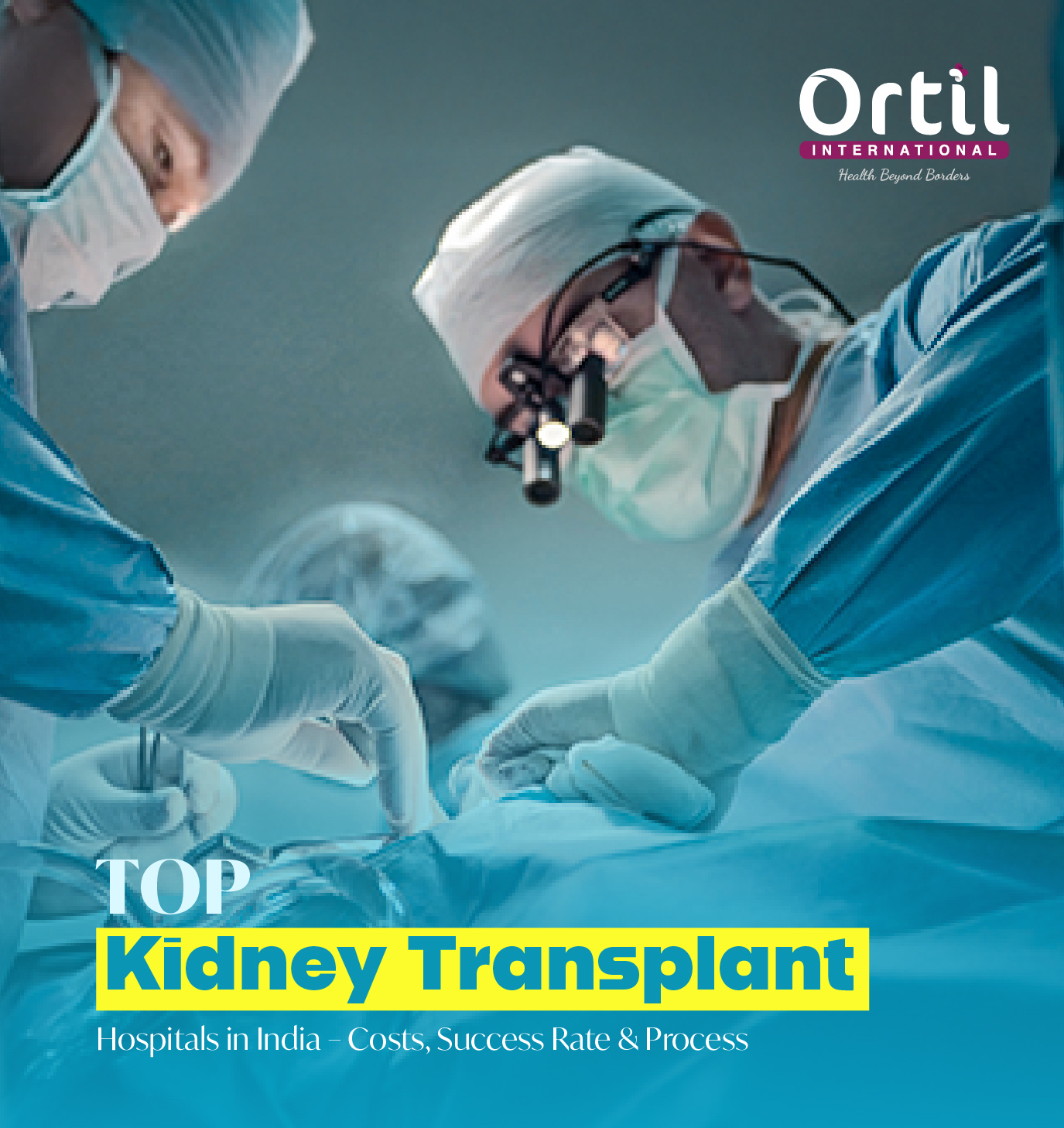Top Kidney Transplant Hospitals in India – Costs, Success Rate & Process
Summary
India is recognized globally for providing world class kidney transplant procedures for a fractional cost compared to Western countries. With qualified surgeons, advanced infrastructure and international care to the patient, India is a prominent destination for patients suffering from terminal renal disease.
Introduction
Kidney Transplant is a growing global health problem and thousands of patients travel from abroad each year for a kidney transplant. India has emerged as a favourite destination for kidney transplants due to its accessibility, medical excellence and legal compliance.
Understanding Kidney Transplant in India
India offers many types of transplants, known for their high success rates due to experienced medical professionals and advanced transplant centres
What is a Kidney Transplant
A kidney transplant is the process of inserting a functioning kidney into an end-stage patient. The transplanted kidney will be responsible for filtering out waste, controlling electrolytes and fluid balance - essential tasks that were once done by the patient's weak/dead kidneys.
Types of Kidney Transplant
-
Live Donor Kidney Transplant: A healthy kidney is donated by a living relative or spouse.
-
Donor kidney transplantation: The kidney is taken from a dead donor after consent from the dear or near onces.
-
Kidney transplantation incompatible with the base: A specialized procedure in which the donor and recipient have different blood groups.
-
Swap Transplant: Two pairs of donor exchange kidney if direct donation is not compatible.
Who Needs a Kidney Transplant
An end-stage renal failure (Stage 5 CKD) patient or a patient with chronic kidney disease, who has functioning kidneys at below 15% capacity, is a candidate. If dialysis becomes necessary, or if the quality of life declines severely, a kidney transplant is often the best option for long-term survival and health.
Pre-Procedure (Preparation Phase)
-
Blood group compatibility tests
-
Tissue matching (HLA typing)
-
Cross-matching and donor evaluation
-
Cardiac, pulmonary, and infection screening
-
Psychological and ethical counselling
-
Legal clearance (for foreign and unrelated donors)
Post-Procedure (Recovery and Follow-Up Phase)
-
Hospital stay of 7–14 days is expected
-
Patients are monitored for organ rejection, infection, and healing
-
Immunosuppressant medications are prescribed for life
-
Regular blood tests and follow-up consultations are necessary for months to years
-
International patients may stay in India for 6–8 weeks for follow-up
Why Choose India for Kidney Transplant
-
Highly skilled transplant surgeons and nephrologists
-
NABH and JCI accredited hospitals
-
Shorter waiting times compared to the West
-
Affordable treatment with transparent pricing
-
Legal and ethical transplant process regulated by the Transplantation of Human Organs Act (THOA)
-
International patient support teams and interpreters
Top Hospitals in India for Kidney Transplant
Cost of Kidney Transplant in India
Cost Components:
Pre-transplant Evaluation and Tests: ₹1,00,000 – ₹2,00,000
Transplant Procedure and Hospital Stay: ₹4,00,000 – ₹7,00,000
Post-transplant Medications and Follow-up Care: ₹1,00,000 – ₹2,00,000 (first 6 months)
Total Estimated Cost:
On average, the total cost of a kidney transplant in India ranges from ₹6,00,000 to ₹10,00,000 ($7,200 – $12,000 USD).
Cost Comparison
|
India
|
$7,000 – $12,000
|
|
USA
|
$250,000 – $350,000
|
|
UK
|
$90,000 – $110,000
|
|
Turkey
|
$20,000 – $30,000
|
|
Thailand
|
$25,000 – $35,000
|
Survival Rates
India has globally competitive outcomes:
-
1-year survival rate for patients: 95–98%
-
1-year graft survival rate: 90–95%
-
With good post-op care, kidney grafts can last 15–25 years
-
Success rates are higher with living donors and early transplants
Factors Influencing Success
-
Donor-recipient compatibility
-
Surgeon and hospital experience
-
Type of transplant (living vs. deceased donor)
-
Patient compliance with medication
-
Pre-existing health conditions
Challenges and Solutions
Challenges:
-
Donor availability and matching
-
Visa and travel logistics
-
Immunosuppressive drug cost
Solutions:
-
Efficient living donor evaluation
-
Medical visa assistance
-
Cost-effective long-term medication support
-
Online follow-up consultations after returning home
How We Help
-
Free treatment planning and cost estimation
-
Fast-track medical visa support
-
Airport pickup and accommodation arrangement
-
Translator services
-
24/7 coordination during hospital stay
-
Post-treatment follow-up and medicine shipping assistance
Legal and Ethical Considerations
-
Transplantation of Human Organs Act (THOA)
-
Authorization Committee approval for unrelated donors
-
Mandatory informed consent and legal documentation
-
This ensures ethical practices and prevents organ trafficking.
Recovery and Life after Treatment
-
Patients can regain work within 6–12 weeks
-
Lifestyle adjustments (diet, hydration, hygiene) are crucial
-
Lifelong medication is essential to prevent infections
-
Periodic check-ups are vital for graft monitoring
Conclusion
Kidney transplant in India offers a lifeline to patients worldwide at a fraction of international costs. With experienced specialists, modern hospitals, and ethical processes, India continues to lead the way in transplant excellence. Patients can expect affordability, quality, and long-term success—all under one roof.
FAQs
Q1: For how long do I have to remain in India for kidney transplant?
Around 6–8 weeks, including pre-transplant evaluation, surgery, and early recovery.
Q2: Can I bring my own donor to India?
Yes. Donor eligibility, legal approval, and blood/tissue compatibility must be verified in advance.
Q3: Are immunosuppressive drugs included in the package?
Initial doses may be included. Monthly costs afterward range between ₹10,000–₹20,000.










